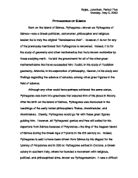Pythagoras founded a society of disciples which has been very influential for some time. Men and women in the society were treated equally -an unusual thing at the time- and all property was held in common. Members of the society practiced the master's teachings, a religion the tenets of which included the transmigration of souls and the sinfulness of eating beans. Pythagoras' followers had to obey strict religious orders where it was forbidden to eat beans, to touch white cocks, or to look into a mirror beside a light.
If all of this seems a bit odd, it might lead us to suspect that Pythagoras' personality reflects the inseparable blend of genius and madness that we associate with many other great men. It is said that once Pythagoras was walking up a lane in Croton when he came by a dog being ill-treated. Seeing this he raised his voice: "Stop, don't hit it! It is a soul of a friend. I knew it when I heard its voice." Spirits, ghosts, souls, and transmigration were obviously things he believed in deeply.
There was an opposition -if not rivalry- in ancient Greece between the gods of the Olymp and the lesser gods of more primitive religions. Pythagoras, like no other, embodied this contraposition of mystical and rational worlds, which is woven into his personality and philosophy. In his mind, numbers, spirits, souls, gods and the mystic connections between them formed one big picture. The following text tells the legend of his own existences:
"He was once born as Aethalides and was considered to be the son of Hermes. Hermes invited him to choose whatever he wanted, except immortality; so he asked that, alive and dead, he should remember what happened to him. Thus, in life he remembered everything, and when he died he retained the same memories. [...] He remembered everything - how he first had been Aethalides, then Euphorbus, then Hermotimus, then Pyrrhus, the Delian fisherman. When Pyrrhus died, he became Pythagoras." (Diogenes Laertius, Live of Philosophers, VIII 4-5)
"Pythagoras believed in metempsychosis and thought that eating meat was an abominable thing, saying that the souls of all animals enter different animals after death. He himself used to say that he remembered being, in Trojan times, Euphorbus, Panthus' son who was killed by Menelaus. They say that once when he was staying at Argos he saw a shield from the spoils of Troy nailed up, and burst into tears. When the Argives asked him the reason for his emotion, he said that he himself had borne that shield at Troy when he was Euphorbus.
They did not believe him and judged him to be mad, but he said he would provide a true sign that it was indeed the case: on the inside of the shield there had been inscribed in archaic lettering EUPHORBUS. Because of the extraordinary nature of his claim they all urged that the shield be taken down - and it turned out that on the inside the inscription was found." (Diogenes Laertius)
After Pythagoras introduced the idea of eternal recurrence into Greek thought, which was apparently motivated by his studies of earlier Egyptian scriptures, the idea soon became popular in Greece. It was Pythagoras' ambition to reveal in his philosophy the validity and structure of a higher order, the basis of the divine order, for which souls return in a constant cycle.
This is how Pythagoras came to mathematics. It could be said that Pythagoras saw the study of mathematics as a purifier of the soul, just like he considered music as purifying. Pythagoras and his disciples connected music with mathematics and found that intervals between notes can be expressed in numerical terms. They discovered that the length of strings of a musical instrument correspond to these intervals and that they can be expressed in numbers. The ratio of the length of two strings with which two tones of an octave step are produced is 2:1.
Music was not the only field that Pythagoras considered worthy of study, in fact he saw numbers in everything. He was convinced that the divine principles of the universe, though imperceptible to the senses, can be expressed in terms of relationships of numbers. He therefore reasoned that the secrets of the cosmos are revealed by pure thought, through deduction and analytic reflection on the perceptible world.
This eventually led to the famous saying that "all things are numbers." Pythagoras himself spoke of "square numbers" and "cubic numbers", and we still use these terms, but he also spoke of oblong, triangular, and spherical numbers. He associated numbers with form, relating arithmetic to geometry. His greatest discovery, the proposition about right-angled triangles, sprang from this line of thought:
Let us suppose each side is an inch long; then how long is the hypotenuse? Let us suppose its length is m/n inches. Then m²/n²=2. If m and n have a common factor, divide it out, then either m or n must be odd. Now m²=2n², therefore m² is even, therefore m is even, therefore n is odd. Suppose m=2p. Then 4p²=2n², therefore n²=2p² and therefore n is even, contra hyp. Therefore no fraction m/n will measure the hypotenuse. The above proof is substantially that in Euclid, Book X." (Bertrand Russel, History of Western Philosophy)
This shows how Pythagoras' proposition immediately raised a new mathematical problem, namely that of incommensurable. At his time the concept of irrational numbers was not known and it is uncertain how Pythagoras dealt with the problem. We may suspect that he was not too concerned about it. His religion, in absence of theological explanations, had found a way to blend the "mystery of the divine" with commonsense rational thought.
From Pythagoras we observe that an answer to a problem in science may give raise to new questions. For each door we open, we find another closed door behind it. Eventually these doors will be also be opened and reveal answers in a new dimension of thought. A sprawling tree of progressively complex knowledge evolves in such manner. This Hegelian recursion, which is in fact a characteristic of scientific thought, may or may not have been obvious to Pythagoras. In either way he stands at the beginning of it.
Proof of Pythagoras Theorem
a²+b² = c²
During this assignment I searched for, ”the life of Pythagoras”, Pythagoras”, “Pythagoras theorems” and” proof of Pythagoras theorems” and these are the websites I used.
http://www.mathsnet.net/dynamic/pythagoras/index.html



![Pythagoras [Samos, 582 - 500 BC].](https://mbt-essays-prod-public.s3.eu-west-1.amazonaws.com/60910/listing/60910_1.jpg)



